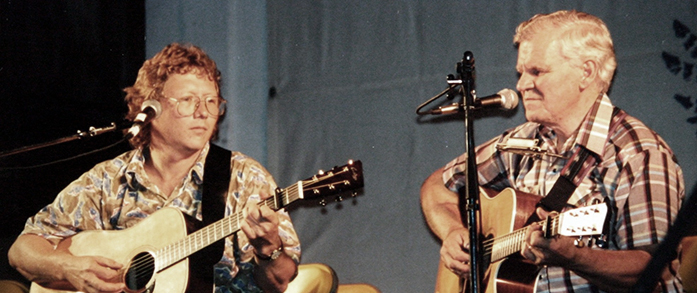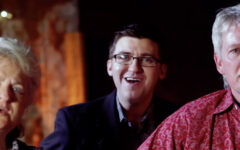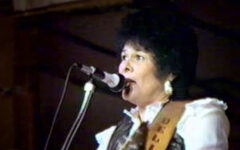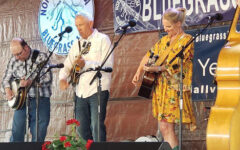
This personal remembrance of Doc Watson comes from Jack Lawrence, Doc’s longtime friend, road companion and musical partner. Lawrence worked with Watson from the time Merle Watson passed until Doc retired. His latest recording, Arthel’s Guitar, is recently released.
It is hard to believe that a year has gone by since the death of my old friend, Doc Watson. He was a mentor, second father, and confidante. I’m still trying to get used to a world without him. I’m sure I’m not the only one.
I discovered Doc when I was quite young. I’d been inspired to play by watching Earl Scruggs play guitar on television, but it was Doc who put the fire in the belly of an eleven year old boy to play. I tossed the fingerpicks and never looked back.
My personal association with Doc began in the late 1970’s when I opened shows for he and Merle. Merle and I became friends, and in the fall of 1983, I got a call from him. He asked if I could meet Doc the next morning to fly to Chicago for a gig. Of course, I couldn’t say yes fast enough. I hadn’t played more than a few tunes with Doc and figured we would have a concentrated rehearsal before the show.
I was wrong. We talked about possible song choices for ten minutes or so, tuned up, and did the show. It must have turned out well, as that was the beginning of a long professional and personal journey together.
At first I expected I would primarily be a rhythm player to Doc’s lead. I quickly found out that wouldn’t be the case. Doc graciously encouraged me, no, demanded I play solos. And within a few gigs asked me to sing a few songs every show. When we jammed with others he always made sure everyone had their moment in the spotlight. I remember a fan telling Doc that he had taught me well. Doc quickly came back saying, “Why would I hire somebody I had to teach how to play? I hired him because he’s a great player.” That’s when I knew Doc respected me as a musician.
Doc, T. Michael Coleman and I were set for a two week tour in October, 1985 when Merle was killed in a tragic accident. Doc was devastated, as we all were. Doc called and asked me to come to Deep Gap. I did so immediately. He told me he didn’t know if he’d ever tour again. Of course, I understood. A few days after our emotional goodbye to Merle, Doc called and told me we would be doing the second week of the tour. We must have been a sad sight during that tour. It was a gut-wrenching experience. Doc realized that Merle wouldn’t want him to quit and that he still had to support his family. The kindness shown by our fans certainly helped our healing process.
I have many fond memories of my life on the road with Doc and T. Michael. The first time I played Carnegie Hall with them I was awed by the venue, and had a rare case of pre-show butterflies. After the first song, Doc leaned over and whispered “The sound ain’t worth a s—” Then I looked out at the half full house and realized it was just a regular gig after all.
After Coleman left the band in 1987 it was just Doc and me on the road. We traveled by air and car which afforded us many long, deep conversations. Doc’s interests were widely varied so I learned about construction, jet engines, books and, yes, music. I know we confided in each other things we had never talked about with anyone else. He was my closest friend.
I own the 1945 D-18 Doc used on his early Vanguard records. The story of how I got it is an example of our loving relationship. I would occasionally stay with Doc and Rosa Lee in their home. One morning I got up, grabbed a cup of coffee, and went downstairs to the music room. There in the corner I spied an old guitar under a layer of dust. I picked it up, dusted it off and plucked the three strings still attached to a nearly pulled off bridge. About the time I sniffed the soundhole, Doc appeared in the doorway. He said, “What in the world are you doing?” I told him the old guitar still had some music left in it and he should get it repaired. He told me he’d worn it out years ago and it wasn’t worth fixing. Over the course of a few years this became a pattern—coffee, music room, dusting, plucking, and sniffing. Doc always said the same thing, “One of these days maybe I’ll just give it to you.” Finally, just before Christmas one year Doc said, “Hell, just take it, it’s worthless.” He just wanted to keep the Grover Rotomatic tuners, the only thing he felt was of value.
I was elated having the guitar I’d listened to on records when I was a kid. After an extensive rebuild, I brought the guitar into the recording studio in Nashville where we did two records in five days in December 1989, On Praying Ground and Dear Old Southern Home. It was a cool thing for this guitar to be used on Doc Watson records again, this time by me. I put the guitar in Doc’s hands and he recognized it immediately. He went on and on about how great it sounded and what a good old friend it had been. I could tell by the look on his face he was rethinking his decision to part with it. I leaned over and whispered in his ear, “One of these days maybe I’ll just give it to you.” I used the D-18 on the road and on several of Doc’s records. I pulled it out of retirement for my latest recording Arthel’s Guitar. I started the recording before Doc’s death but finishing it after his passing was a very emotional experience.
I spent 25 years out of 43, over half of my professional career, working with Doc. This has impacted me greatly. I’ve learned to face my life and career with humility and grace. My late father and second father, Doc, taught me to be the man I am today. I hope I do them both proud.
Doc always called me “Brother Jack.” So I’ll sign off now the way he introduced me on stage:
“On guitar… Brother Jack Lawrence from Harrisburg, NC.”







